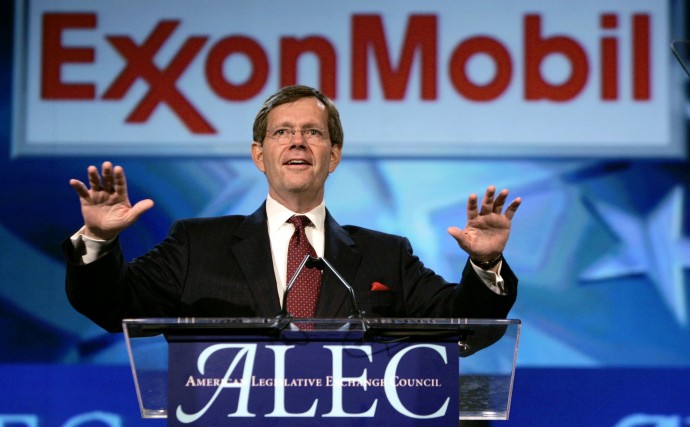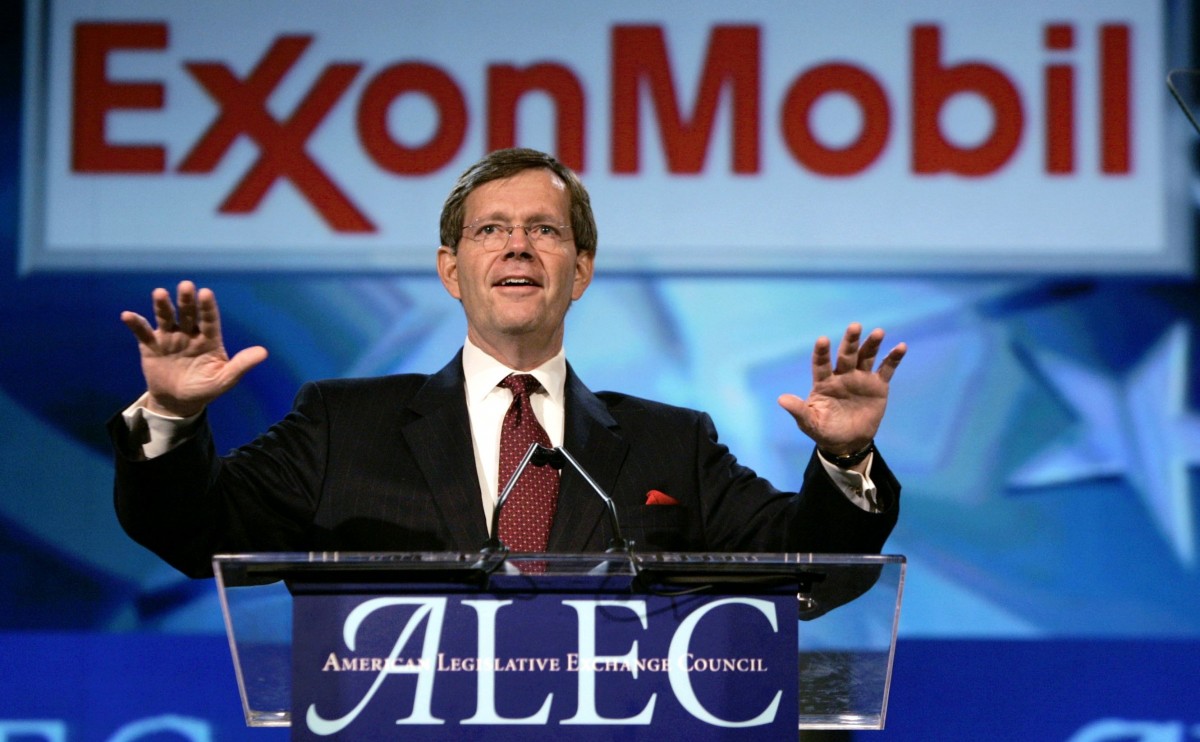
(MintPress)-The Coca-Cola Company announced its decision to withdraw its membership from the American Legislative Exchange Council (ALEC) on Monday, just hours after ColorofChange launched an online campaign demanding that companies stop funding the organization behind controversial legislation including the Stand Your Ground and voter ID laws.
“The Coca-Cola Company has elected to discontinue its membership with the American Legislative Exchange Council (ALEC),” the company announced. “Our involvement with ALEC was focused on efforts to oppose discriminatory food and beverage taxes, not on issues that have no direct bearing on our business. We have a long-standing policy of only taking positions on issues that impact our Company and industry.”
ALEC, once a little-known organization, has recently garnered widespread attention because of the group’s role in spreading the controversial Stand Your Ground legislation, which allows a person to use deadly force against someone they believe is threatening and may prevent a Florida man from being arrested for the murder of 17 year-old Trayvon Martin.
“We welcome Coca-Cola’s decision to stop supporting the American Legislative Exchange Council, an organization which has worked to disenfranchise African Americans, Latinos, students, the elderly, the disabled, and the poor,” said ColorofChange, which works to empower Black America’s political voice.
Supported by over 20 major corporations and thousands of state legislators, ALEC writes and supplies model legislation to various legislators. On its website, the group boasts that over 1,000 of its bills are introduced by legislative members every year, and that one-fifth of its proposed legislation is enacted into law.
ALEC claims that Florida’s “Stand Your Ground” legislation is being blown out of proportion by groups wishing to take advantage of the Trayvon Martin incident in order to further political agendas.
“In the end, we will always respect people who disagree with us in matter of policy, but it is simply wrong to try to score political points by taking advantage of a great tragedy like Trayvon Martin’s death,” ALEC said in a statement,
Corporate Support Vital to ALEC Revenues
While Coca-Cola pulls its membership, dozens of other major corporations including HP, Walgreens, Johnson & Johnson, State Farm Insurance Co., and Chevron, continue to funnel millions of dollars to ALEC each year.
ALEC reportedly received $1.4 million in grants from ExxonMobil from 1998-2009. Although ALEC does not release information publicly on its membership and donations, ThinkProgress reported that BP, Reynolds American, and Takeda Pharmaceutical are believed to have donated over $100,000 each to the organization in 2011.
The Koch family, owners of the second largest privately owned company in the US and known for advocating conservative, libertarian policies, also awarded large financial grants to ALEC through two family-backed foundations in 2011.
Members of ALEC’s Private Enterprise Board include Bayer Corp., Wal-Mart Stores, PhRMA, Kraft Foods, Inc., Pfizer Inc., UPS, and formerly Coca Cola. Wal-Mart and Kraft have announced they will both remain members of ALEC despite pressure from groups like ColorofChange.
Wal-Mart said in a statement, “Our membership in any organization does not affirm our agreement with each policy created by the broader group. Wal-Mart has a long history of supporting voter rights, and we continue to be a strong proponent of this issue…One of Wal-Mart’s basic beliefs is respect for the individual, and Wal-Mart will continue to stand with all Americans in ensuring our right to vote.”
More than Corporations – ALEC’s Legislative Support Group
ALEC channels the millions of dollars it receives from big corporations each year towards dominant legislative proposals in states like Arizona, Colorado, Michigan, New Hampshire and Maine. According to its website, ALEC promotes policies that “advance the Jeffersonian principles of free markets, limited government, federalism, and individual liberty.”
In the eyes of ALEC’s opponents, this means easing environmental protections, toughening voter-registration laws and discriminatory immigration policies, cutting union benefits, weakening civil rights, and shifting from a public to private sector society.
John Dunbar, a managing editor at the Center for Public Integrity, a Washington watchdog group, told The Sunday Star-Ledger in New Jersey that this legislation just keeps popping up. Dunbar said “Until the legislators themselves are called on it, until the governor is called on it, until people ask, ‘Why are you doing the bidding of this group?’ It’s going to keep happening.”
The Sunday Star-Ledger reported this week on at least three education reform bills, one executive order, and one agency rule introduced by NJ Gov. Chris Christie that mirror the goals set out in ALEC’s model legislation almost identically in eight instances.
The report also examined campaign finance records from the New Jersey Election Law Enforcement Commission, which showed New Jersey legislators who are in ALEC or have introduced bills resembling ALEC models have received $202,000 from the same corporations funding the council, including $57,700 since 2010.
Governor Christie called the report “completely ridiculous” and “a bunch of research and a conspiracy theory in search of a story.”
Could Wisconsin’s ALEC connection lead to Walker’s Recall?
Wisconsin politicians in particular have maintained a strong alliance with ALEC over the years – an alliance that may force Governor Scott Walker out of office this year.
Former Wisconsin Governor and early ALEC member, Tommy Thompson said at a 2002 ALEC conference, “Myself, I always loved going to these meetings because I always found new ideas. Then I’d take them back to Wisconsin, disguise them a little bit, and declare that ‘It’s mine.’”
Now, Governor Walker is carrying on the Thompson tradition by introducing a half dozen ALEC-inspired bills in the first weeks and months in office, according to PR Watch. Walker, an active member of ALEC from 1993-2002, could become the third governor to be recalled in the history of US politics after a contentious collective bargaining dispute resulted in a statewide petition calling for a gubernatorial recall election, which is scheduled for June of this year.
The Wisconsin Budget Repair Bill, which sparked a wave of protests encompassing as many as 100,000 Wisconsinites in February 2011, included legislation to limit collective bargaining rights that falls in line with model bills available through ALEC including the “Public Employee Freedom Act” and the “Public Employer Payroll Deduction Policy Act.”
The particular statute in question effectively made Wisconsin a “Right to Work” state, prohibiting unions from collecting required membership fees and limiting collective bargaining strictly to wages not exceeding a capped amount.
In response to a question about making Wisconsin a “Right to Work” state, Senate Majority Leader Scott Fitzgerald said in a December 2010 interview, “I just attended an American Legislative Exchange Council meeting and I was surprised about how much momentum there was in and around that discussion, nothing like I have seen before.”
Twenty-three states have “Right to Work” laws in place, with several others seeking similar legislation in Congress this year. Alliance for a Better Minnesota published a report urging politicians to stay away from the “ALEC corporate agenda” that was adopted by its neighbor to the East; meanwhile its own “Right to Work” legislation is stalled in the state Senate.
Update: Kraft has since announced that it has decided not to renew its membership with ALEC when it expires this spring, making it the third corporation to do so. Kraft did not directly mention the ColorOfChange campaigns in its reasoning for leaving the group.


